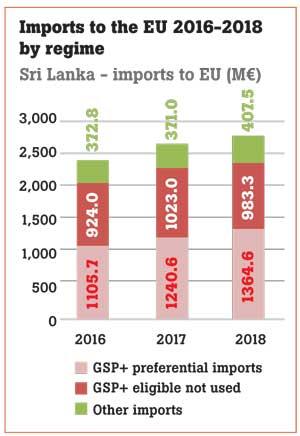13 Feb 2020 - {{hitsCtrl.values.hits}}
Sri Lanka engaged well with the European Union (EU) on the GSP Plus compliance issues during the 2018-2019 period, according to the latest report issued by the
European Commission (EC).

The report said the EU conducted a GSP Plus monitoring mission in Sri Lanka, from August 26 to September 3, 2019.
During the reporting period 2018-2019, the monitoring focused on several priority areas such as the moratorium on death penalty, repeal of the Prevention of Terrorism Act (PTA), adoption and implementation of legislation against domestic violence, combating sexual exploitation of children, prevention of torture and
anti-discrimination legislation.
Sri Lanka, as a GSP Plus beneficiary, made progress in the effective implementation of the 27 international conventions listed in the arrangement, according to
the report.
In 2018, Sri Lanka’s exports under GSP Plus to the EU were euro 1,364.6 million while GSP Plus eligible but not used export quota amounted to euro 983 million.
“A majority (84 percent in 2018) of Sri Lankan imports to the EU are GSP Plus eligible.
However, the utilisation rate (the proportion of the EU imports from Sri Lanka that actually benefitted from GSP Plus preferences) has room for improvement at under 60 percent. Nonetheless, there has been an upward trend in utilisation rates over the past three years. Sri Lankan imports under GSP Plus are concentrated in apparel and clothing (54 percent) and rubber (19 percent),” the report stated.
GSP Plus preferences for Sri Lanka were withdrawn in 2010 due to significant shortcomings in the country’s implementation of three UN human rights conventions. Sri Lanka was readmitted to GSP Plus as of May 19, 2017.
According to the report, Sri Lanka was able to reduce child labour to one percent (from 16 percent), partly through pioneering ‘Child Labour Free Zones’ and committed to a goal of zero percent by 2022.
However, with regard to human rights, while the space for civil society and media to operate has improved post-2015, challenges remain, it said.
Nevertheless, the report said during the period under review, progress was made on the implementation of the international conventions specified in the GSP Regulation, through strong cooperation with the government authorities and intensive dialogue.
“It will be important for this progress to continue under the new administration headed by President Gotabaya Rajapaksa, to ensure renewed commitment to strengthen the recently established institutions and to continue legislative reforms,” the report noted.
The report also noted that Sri Lanka had taken several positive steps during the period with establishing the Office on Missing Persons and Office for Reparations and accession to the Optional Protocol to the UN Convention against Torture (OPCAT), adoption of Enforced Disappearances Act and Right to Information Act, which reflect strong commitments to democracy and transparency.
“Yet, progress is fragile, especially with regard to accountability. In the aftermath of the Easter Sunday terrorist attacks, the situation of minorities has become tense. Prevention of torture is on the agenda but actions need to be stepped up in terms of accountability,” the report noted.
16 Nov 2024 1 hours ago
16 Nov 2024 1 hours ago
16 Nov 2024 2 hours ago
16 Nov 2024 2 hours ago
16 Nov 2024 4 hours ago